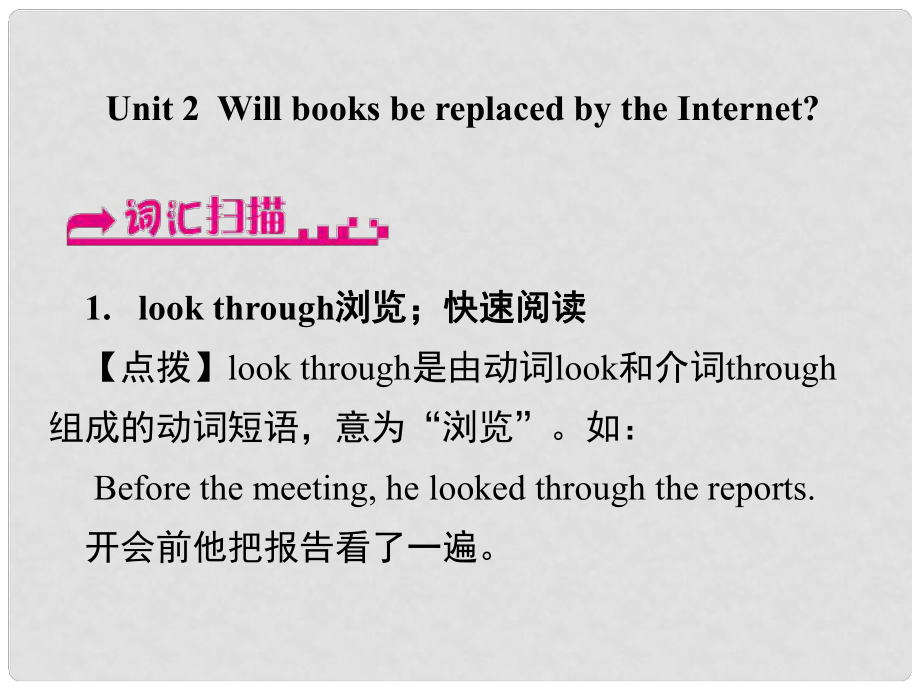《浙江省嘉興市秀洲區(qū)九年級英語上冊 Module 9 Unit 2 Will books be replacedthe Internet課件 (新版)外研版》由會員分享��,可在線閱讀���,更多相關(guān)《浙江省嘉興市秀洲區(qū)九年級英語上冊 Module 9 Unit 2 Will books be replacedthe Internet課件 (新版)外研版(18頁珍藏版)》請在裝配圖網(wǎng)上搜索。
1���、Unit 2 Will books be replaced by the Internet? 1. look through瀏覽�����;快速閱讀瀏覽��;快速閱讀 【點撥】look through是由動詞look和介詞through組成的動詞短語��,意為“瀏覽”���。如: Before the meeting, he looked through the reports. 開會前他把報告看了一遍。 【延伸】look可以和很多詞構(gòu)成短語�����,常見的如下: (1)look about/around有如下含義: 1)意為“環(huán)顧四周”。如: The man kept looking about. 這個人不停地環(huán)顧四周��。
2�、2)意為“隨便看;到處看”���。如: What can I do for you, madam? 夫人���,想買什么嗎? No, Im just looking around. 不,我只是隨便看看����。 (2)look after意為“照顧;照料����;關(guān)心”。如: I can look after myself. 我能照顧自己���。 Who is looking after the luggage? 誰在照看行李? (3)look at意為“看�;注視”�。如: He looked at me and smiled. 他望著我笑了。 (4)look back on意為“回顧;回想”�����。如: I still shudde
3���、r when I look back on the past. 想起過去��,我仍然不寒而栗����。 (5)look down on/upon意為“看不起�����;瞧不起”�。如: You shouldnt look down upon the poor. 你不應(yīng)該瞧不起窮人����。 (5)look down on/upon意為“看不起;瞧不起”�。如: You shouldnt look down upon the poor. 你不應(yīng)該瞧不起窮人。 (6)look for意為“尋找”�。如: Ive looked for it everywhere. 我到處找過它了。 (7)look forward to意為“期待;盼望
4���、”�����。如: Were looking forward to hearing from you. 我們盼望著收到你的來信����。 The children are looking forward to your visit. 孩子們都盼望著你的到來�。 【注意】該結(jié)構(gòu)中的to是介詞,不是不定式符號�����,所以其后接動詞時要用動名詞形式���,而不用動詞原形�。 (8)look into意為“調(diào)查���;研究�����;了解”�����。如: Well look into that right away. 我們會馬上調(diào)查那件事的�����。 (9)look like意為“看起來像”�。如: He looks like your brother. 他看上去像你
5、哥哥�。 (10)look out有如下含義: 1)意為“向外看”。如: Dont look out of the window. 別往窗外看��。 2)意為“注意���;當(dāng)心;小心”��。如: Look out!Theres a car coming! 當(dāng)心!有輛汽車來了! (11)look over意為“審閱��;翻閱���;打量��;檢查”�����。如: Would you mind looking over my exercises? 請你幫我檢查一下我的練習(xí)題好嗎? He looked her over and nodded lightly. 他上下打量她���,然后微微點了點頭����。 (12)look up意為“查閱����;查找”。如
6�����、: Look up this word in the dictionary. 在詞典里查查這個詞吧�。2. as a result作為結(jié)果;因此作為結(jié)果���;因此 【點撥】as a result意為“作為結(jié)果����;因此”,表示某種情況或行為所帶來的后果�,通常單獨(dú)使用。如: He works hard at his lessons. As a result, he can pass all the exams. 他努力學(xué)習(xí)功課�����。因此�,他可以通過所有的考試。 【延伸】as a result of與as a result僅一詞之差�����,意為“作為的結(jié)果�;由于”,后接名詞或名詞性短語��,表示原因����。如: As a re
7��、sult of warning, nobody was hurt. 由于得到了警告�,因此沒有人受傷。3. be replaced by被被所取代所取代 【點撥】be replaced by意為“被所取代”�����,replace的常見用法還有:replace.with.,意為“用代替”�。如: The broken chair was replaced by a new one. 那把壞椅子被一把新椅子取代了。 1. Developments in printing made it possible to produce books more quickly and cheaply. 印刷術(shù)的發(fā)展使更快
8���、更便宜地生產(chǎn)書本成為可能�����。印刷術(shù)的發(fā)展使更快更便宜地生產(chǎn)書本成為可能����。 【點撥】此句中��,主語為Developments inprinting�,謂語為made,it為形式賓語����,possible為賓語補(bǔ)足語,真正的賓語為to produce books more quickly and cheaply�����。歸納來說,此句型結(jié)構(gòu)為:主語+謂語+形式賓語it+形容詞+動詞不定式(真正的賓語)��。如: I found it exciting to go hiking on weekends. 我發(fā)現(xiàn)周末去徒步旅行是令人興奮的���。 Why do you think it very important to sto
9���、p smoking? 為什么你覺得戒煙是非常重要的? 2. A much larger amount of information can be stored in more varied forms on the Internet than in books. 網(wǎng)絡(luò)可以比書儲存更大量��、更多樣化的信息��。網(wǎng)絡(luò)可以比書儲存更大量����、更多樣化的信息。 【點撥】(1)a large amount of意為“大量的”����,修飾不可數(shù)名詞,相當(dāng)于a good/great amount/deal of, much等���。 (2)in the form of意為“以的形式”�。 3. .but it was the in
10�����、vention of the World Wide Web that made it really useful to people. 但是����,是萬維網(wǎng)的發(fā)明使它變得對人們確實有但是,是萬維網(wǎng)的發(fā)明使它變得對人們確實有用���。用�。 【點撥】這是一個強(qiáng)調(diào)句型�,被強(qiáng)調(diào)的部分是the invention of the World Wide Web。強(qiáng)調(diào)句的基本結(jié)構(gòu)為:It is/was+被強(qiáng)調(diào)部分+that/who+句子的其他成分�����,其中的it沒有實際含義��。被強(qiáng)調(diào)部分可以是主語����、賓語或狀語。若被強(qiáng)調(diào)的是人�����,且為句子主語時,用who或that皆可��;若被強(qiáng)調(diào)的是其他成分���,則一律用that引導(dǎo)��。強(qiáng)調(diào)句型的判斷方法
11��、是將It is/ was. that/ who去掉���,若剩下的主干完整,即為強(qiáng)調(diào)句型�����。如: It was on a cold morning that I was born. 我是在一個寒冷的早上出生的�����。 It is his mother that/who prepares the meals. 是他母親做的飯�����。 4. .so not all people can afford them. 所以,并不是所有的人都能買得起它們�����。所以����,并不是所有的人都能買得起它們��。 【點撥】在英語中����,all, both, every, everyone, everything, everybody, everywhere等和否定詞not或no連用時,表示部分否定�����,而非全部否定�。若表示全部否定,要用none, neither, no one, nothing等���。如: Not every person likes living in the cities. 并不是每一個人都喜歡住在城市��。
 浙江省嘉興市秀洲區(qū)九年級英語上冊 Module 9 Unit 2 Will books be replacedthe Internet課件 (新版)外研版
浙江省嘉興市秀洲區(qū)九年級英語上冊 Module 9 Unit 2 Will books be replacedthe Internet課件 (新版)外研版

